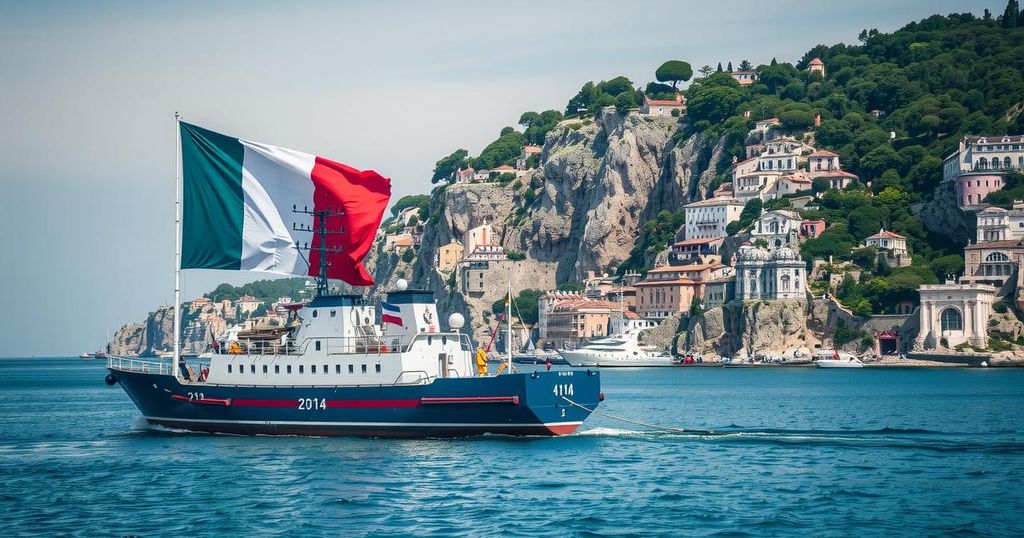Global news
AFRICA, ARMS TRADE, ASIA, EUROPE, EUROPE/ASIA, GEOPOLITICS, HA, HARCHAOUI, INTERNATIONAL RELATIONS, ITALY, JA, JALEL HARCHAOUI, KHALIFA HAFTAR, LA REPUBBLICA, LIBYA, LONDON, MILITARY, NATO, ROYAL UNITED SERVICES INSTITUTE, ROYAL UNITED SERVICES INSTITUTE THINK TANK, RUSSIA, RUSSIA-UKRAINE WAR, SYRIA, UNITED KINGDOM
Jamal Walker
0 Comments
Italy Raises Alarm Over Russian Military Movements from Syria to Libya
Italy is alarmed by Russia’s military asset transfers from Syria to Libya, raising security concerns in the Mediterranean. Defense Minister Guido Crosetto emphasized the threat posed by Russian naval presence in proximity to Italy. Speculation surrounding the relocation of Russian ships to Tobruk suggests strategic military interests as Russia seeks alternatives for Mediterranean access following the potential loss of Tartus. Amidst this, U.S. officials and analysts are closely watching the situation, especially regarding implications for NATO and Turkish interests.
Italy is expressing serious concerns regarding Russia’s transfer of military assets from Syria to Libya, which is perceived as a growing security threat in the central Mediterranean region. Italian Defense Minister Guido Crosetto highlighted the significance of this movement, stating that the presence of Russian ships and submarines in proximity to Italy raises alarm. Following the recent retreat of Syrian leader Bashar Assad’s forces, satellite images indicate that Russian naval vessels previously stationed at Tartus have set sail, with speculation suggesting potential relocation to Tobruk, Libya, where the Kremlin has engaged in negotiations with Gen. Khalifa Haftar for port access.
The Kremlin’s potential loss of Tartus would render the Libyan port increasingly attractive for Russia to establish a naval presence in the Mediterranean. Analyst Jalel Harchaoui referenced an uptick in Russian flights to Libya, indicating heightened military activity in the region. Current engagement appears more significant, with recent cargo flights arriving from Belarus and Russia, implying a strategic use of Syria as a logistical hub for operations in Africa, although not integral.
Moscow already maintains military bases in eastern Libya, serving as logistical support for operations backing coup leaders in sub-Saharan Africa. Harchaoui speculated on the implications for Western allies if Russian warships indeed relocate to Tobruk, suggesting it would represent a blatant indication of NATO’s diminishing influence in the region. Ben Fishman from the Washington Institute affirmed that Russia’s outreach towards Haftar aligns with the possibility of military asset movements to Libya.
Haftar’s ongoing discussions with U.S. officials and his recent interactions with U.S. diplomats signify a complex web of geopolitical dynamics. Mohamed Eljarh from Libya Desk pointed out that while there are no formal agreements for Russian military presence in Libya, informal arrangements might establish the groundwork for future cooperation. The situation remains fluid, with conflicting accounts regarding the extent of Russian movements into Libya.
In light of these developments, Claudia Gazzini emphasized the role of Turkey, which supports the Tripoli government, suggesting that any potential Russian entry into Libya must consider Turkish perspectives. Turkish-Russian engagements on the matter could significantly influence the trajectory of military operations in Libya.
The reported movement of Russian military assets from Syria to Libya has drawn considerable attention and concern from Italian authorities, particularly due to the implications for security in the central Mediterranean. Following substantial military support for Syrian President Bashar Assad, the shifting of resources away from Syria could mark a strategic pivot for Russia towards consolidating influence in North Africa. As Moscow engages with local leaders in Libya, including General Khalifa Haftar, speculation abounds regarding the establishment of a Russian naval presence in the region amidst tensions with NATO and U.S. interests. This shift reflects broader geopolitical contests involving various state actors, including Turkey, which supports the Tripoli government.
In summary, the potential transfer of Russian military assets from Syria to Libya represents a significant concern for Italy and its allies, suggesting a reconfiguration of regional security dynamics in the Mediterranean. This situation prompts further scrutiny of Russia’s strategic intentions in Libya, particularly in relation to its partnerships with local actors like Haftar and the responses from Western nations. The involvement of Turkey adds another layer of complexity, necessitating careful observation of future developments as all parties navigate this evolving landscape.
Original Source: www.defensenews.com




Post Comment